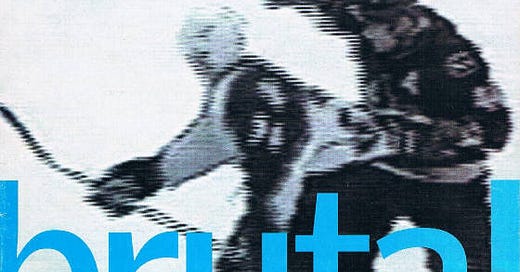Bertuzzi-Moore 20 Years Later
Looking back at one of the ugliest on-ice incidents in NHL history.
Before I was struck down a few weeks ago with the worst sinus infection I’ve ever experienced, I realized I hadn’t taken note of a particularly gruesome NHL anniversary, in this case, the passage of 20 years since Vancouver Canucks winger Todd Bertuzzi attacked Colorado Avalanche center Steve Moore on March 8, 2004.
The assault — and make no mistake that’s exactly what it was — which ended Moore’s career, was in retaliation for a hit that Moore delivered to Vancouver’s Markus Naslund on February 16 in Denver. At the time, Naslund, who had started his career in the shadow of Mario Lemieux and Jaromir Jagr in Pittsburgh, had emerged as one of the greatest offensive talents in all of hockey.
As hard as it is to believe today, that hit, which left Naslund with a minor concussion, went unpenalized, a decision that sent Vancouver head coach Mark Crawford and his players into apoplexy. They vowed vengeance, and Vancouver winger Brad May even called for a bounty to be placed on Moore’s head, Slap Shot-style. Despite this, when the teams met again on March 3, 2004, they played to a rather quiet 5-5 tie — thanks in large part to the fact that NHL Commissioner Gary Bettman and his top lieutenant, Colin Campbell, were in the stands at the game.
The message from the league was clear: if the teams engaged in any extra-judicial accountability, the league would act swiftly to punish the perpetrators.
Bettman and Campbell were nowhere to be found when the teams played again on March 8, 2004 in Vancouver. Early on, Vancouver tough guy Matt Cooke challenged Moore to a fight, and Moore, not exactly a typical NHL enforcer considering he played four seasons at Harvard, readily accepted. When it comes to hockey’s “code” that should have been all that was necessary, but it wasn’t enough for Bertuzzi, who took the law into his own hands with Vancouver trailing 8-2 in the third period.
What happened next has been extensively documented elsewhere. I’d recommend Terry Frei’s account of the incident from Mile High Sports as a great place to start when it comes to excavating the incident and its consequences. Moore never played in the NHL again. Bertuzzi was suspended from the NHL for 17 months, though thanks to the 2004-05 lockout that wiped out an entire season, he only missed a total of 20 games, the same amount of games that Dale Hunter missed after he took a shot at Pierre Turgeon after the whistle in a 1993 playoff game. He also pleaded guilty to assault causing bodily harm, and eventually was sentenced to 80 hours of community service and one year of probation. He would play another nine NHL seasons and even earned an invitation to play for Team Canada at the Winter Olympics in 2006. And while there were lawsuits, the last of them was quietly settled out of court in 2014. a full decade after the assault.
While casual sports fans like to associate ice hockey with violence, it’s important to stress just how out of character Bertuzzi’s attack on Moore was even in the game as it was played in the early 2000s. By early 2004, Bettman was in firm control of the league and its overall direction after more than a decade as commissioner, control that he had won with the help of the owners as he wrested it from the old-line general managers who used to run professional hockey.
The era of the enforcer in the NHL didn’t end with Bertuzzi’s attack on Moore, but it might as well have. After the 2004-05 lockout, the league returned with a salary cap, and it got that much harder to justify paying cap dollars to players who couldn’t skate an honest shift in addition to keeping the peace on the ice. And while there are players who serve that role today — New York Rangers winger Matt Rempe being a prime example — they ought to be able to do a bit more to hang on to a roster spot.

What I can’t put aside is the injustice of it all. Moore lost his career, and Bertuzzi played for almost another decade, even getting an Olympic nod in the wake of the attack. It almost seemed as if the NHL did all that it could to facilitate his return to the game, and there were plenty folks in sports media who were eager to help.
They know who they are and they ought to be ashamed.





Can't believe that was 20 years ago. Not sure if it exists, but a potential interesting article (or maybe a book) would be to look at some of the more heinous acts of sports violence, their impact on the sport and participants, how they were handled at the time, their legacy, etc. Kermit Washington / Rudy T ... Juan Marichal / Joh Roseboro, etc.